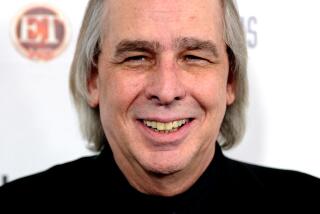Colorful Disc Jockey Wolfman Jack Dies
- Share via
Wolfman Jack, the disc jockey whose internationally known gravelly voice punctuated by wolf-man howls of “how-wooooo!” made him an American rock ‘n’ roll icon, died Saturday of a heart attack. He was 57.
The colorful entertainer, whose real name was Robert Weston Smith, had just returned to his Belvidere, N.C., home 120 miles east of Raleigh when he collapsed, said Lonnie Napier, vice president of Wolfman Jack Entertainment. Smith had been on a 20-day tour to promote his book “Have Mercy, the Confession of the Original Party Animal,” about his early career.
Napier said Smith, a heavy smoker who had been overweight for many years, had recently lost 40 pounds through diet and exercise.
Smith had made his final syndicated radio broadcast from a Planet Hollywood restaurant in Washington, D.C., on Friday night.
A longtime Los Angeles resident who once said he wanted “to be no more than 20 minutes from Sunset Boulevard for the rest of my life,” Smith had broadcast his syndicated show from Los Angeles station KDAY in the early 1970s and returned to KRLA in 1984 to spin golden oldies.
During the height of his popularity, he was syndicated to more than 2,000 stations throughout the United States and 53 other countries.
Smith took on legendary status in popular culture when he played himself in George Lucas’ 1973 film “American Graffiti.”
With his familiar horror film-inspired makeup, he hosted “The Midnight Special” TV show based in Los Angeles from 1973 to 1982.
He also added his face to the famous voice on “The Wolfman Jack Show” telecast throughout the United States and 24 other countries in 1978 and 1979.
Born in Brooklyn, Smith cut school in the 1950s to hang out at radio stations, finally getting hired as a gofer to fetch burgers for deejays.
“I learned from some of the biggest jocks in the business,” Smith told The Times in 1987. “One of the deejays I worked with, Alan Freed, would come on the air as ‘Moondog,’ with animal growls and wolf howls and rattling chains. Another animal-type jock was ‘The Hound’ in Buffalo.
“That’s where the whole ‘Wolfman Jack’ thing came from,” he said. “I began emulating their styles and, eventually, I developed a style of my own.”
The style involved the “how-wooooo” cry of a wolf, the maniacal laughter of a hyena, and the screaming announcement of song titles with the brazen bark of a Marine Corps drill instructor.
But it was all too bizarre, too outrageous, too histrionic for American radio. Smith couldn’t get hired.
So he went to Mexico and immediately became the king of the lunatic night airwaves.
He broadcast from two border rock stations, XERF in Ciudad Acuna and XERB in Rosarito Beach, each with powerful 250,000-watt signals aimed directly north.
“You could drive from New York to Los Angeles at night and never lose the stations--or the Wolfman. How-woooooo!” he said with characteristic lack of modesty. “I was in total control of the two biggest commercial radio stations in the world.”
Winning acceptance by American radio managers by 1969, Smith moved first to Los Angeles’ KDAY and then New York’s WNBC to broadcast his syndicated show.
Later, he kept busy with television appearances, organizing national concert tours, producing oldies programs, and writing.
Smith also appeared in such films as “Hanging on a Star” in 1976, “Dead Man’s Curve” in 1977, “Motel Hell” in 1980 and “Mortuary Academy” in 1987.
He was immortalized in 18 pop/rock songs including “Clap for the Wolfman” by the Guess Who, “Living on the Highway” by Freddie King and “Wolfman Jack” by Todd Rundgren.
“The legend of Wolfman Jack is more than me, more than I ever was,” the mellowing Smith said as he neared his 50s. “And the man--well, he’s just happy to have survived this long.”
Smith is survived by his wife of 34 years, Lou Lamb Smith; a daughter, Joy Rene, and a son, Tod Weston.
More to Read
The biggest entertainment stories
Get our big stories about Hollywood, film, television, music, arts, culture and more right in your inbox as soon as they publish.
You may occasionally receive promotional content from the Los Angeles Times.










